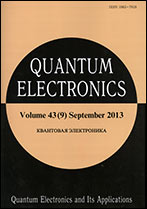|
Brief Communications
Influence of screened Coulomb interaction on the optical amplification spectra of CdS
B. M. Lavrushin, R. F. Nabiev, A. S. Nasibov, Yu. M. Popov
Abstract:
A numerical method was used to calculate the optical amplification spectra of an electron–hole plasma in CdS making an allowance for the screened Coulomb interaction between electrons and holes. It was found that the interaction can increase significantly the calculated value of the optical gain.
Received: 18.07.1984
Citation:
B. M. Lavrushin, R. F. Nabiev, A. S. Nasibov, Yu. M. Popov, “Influence of screened Coulomb interaction on the optical amplification spectra of CdS”, Kvantovaya Elektronika, 12:5 (1985), 1084–1086 [Sov J Quantum Electron, 15:5 (1985), 714–715]
Linking options:
https://www.mathnet.ru/eng/qe7103 https://www.mathnet.ru/eng/qe/v12/i5/p1084
|


| Statistics & downloads: |
| Abstract page: | 188 | | Full-text PDF : | 67 | | First page: | 1 |
|





 Contact us:
Contact us: Terms of Use
Terms of Use
 Registration to the website
Registration to the website Logotypes
Logotypes









